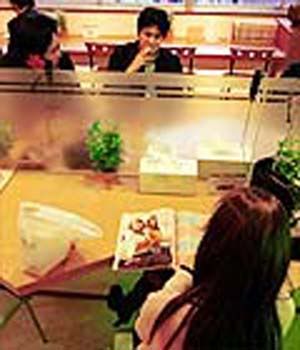No wonder I can't get a date...
Osaka Journal: Japanese Date Clubs Take the Muss Out of Mating
OSAKA, Japan — With its blue tobacco haze, mellow jazz and slick decor, the Tu-Ba Cafe looks, at first glance, like any singles bar anywhere.
A visitor quickly begins to notice, though, the things that set this place apart from the other pickup joints and after-hours watering holes that dot downtown Osaka. No alcohol is served, for one thing. But above all, men and women are kept apart by a divider of smoked glass that lets them size each other up surreptitiously, and therefore avoid embarrassment.
Japanese men and women have a history of going to extraordinary lengths to meet each other, from the protocol-heavy courtships of powdered faces and opaque screens used in the feudal era to today's carefully arranged dating parties and omiai, or elaborately researched matings, that still account for about 10 percent of Japan's weddings.
But in a country where shyness runs deep, and loneliness often seems to be endemic, people are flocking to a variety of innovative dating services, like this membership-only dating bar.
"We get at least 100 new women members every month, and in this club I average over 50 customers a day," said the bar's owner, Hiromoto Fukuda, 45, a slender, carefully coiffed man who dresses in loose-fitting black clothes. "The model has been so successful that I've opened six clubs like this in the Osaka area, two in Tokyo and one each in Nagoya, Kyoto and Kobe. You could say that I am making a lot of money. Things are bubbling."
Many of Japan's recent dating services involve new technologies, especially the cellular phone, which has swept the country to the point that most pedestrians waiting at stoplights in some neighborhoods seem to be navigating by them.
A look at the popularity of cell phone dating services seems to indicate that many people are looking for love. A best-selling directory produced by Softbank Publishing Inc. cites 800 find-a-friend sites available via NTT DoCoMo's i-Mode, Japan's most popular cellular network.
"It's not only young people who are using the i-Mode meeting sites," said Mitsutoshi Sakabe, executive director of Softbank Publishing. "Anyone capable of using a mobile phone can do it."
Invoking a widely held myth here that all Japanese are middle-class, he explained that meeting in this way had become popular, because Japanese, perhaps unlike people in some other societies, "don't have to be concerned about race, religion and the socio-economic standard of others — so you can just send your e-mail and make friends instantly."
But for Mr. Fukuda, who has spent a lifetime laboring in the cafe and bar business — when he has not been working as a marriage counselor, that is — all of the newfangled electronic means of meeting strangers take the fun out of the chase.
In his new clubs, men must pay a membership fee of about $100, plus about $20 a visit. Women must also register as members, but pay no fee.
As they eye each other discreetly across the glass divide, which conveniently includes two transparent strips, the person who has identified someone to his liking (usually, but not always, a man selecting a woman) writes a brief "love note" on a sheet of paper. The note is handed to a waiter, who carries it around the divide to the other party.

A recipient who approves usually writes a reply, and a courtship is born. If not, though, little face has been lost, and often a suitor will keep trying until someone says yes.
The club encourages the parties to carry on their courtship outside, and Mr. Fukuda said that could mean at a restaurant, or, with a wink and a grin, often a nearby hotel.
This is a country where people usually avoid eye contact or public displays of affection and where many even seem to dread spontaneous conversation with strangers like a strain of the plague. And so the key to the success of these clubs, as with so many other dating services, would seem to be that it protects the ego of the suitor and shields the courted from embarrassment.
"The Japanese are very shy, except when they are very young, and Japanese men are afraid of chatting up women because they are afraid of being turned down," Mr. Fukuda said. "They don't know how to work through their fear, and unless there is some kind of catalyst, they just feel like they are locked in a cage. It is very hard for people to get together like that."
As the owner spoke, an elegantly dressed young woman who had been sitting at the bar, quietly reading a magazine, was handed an invitation from a man on the other side of the divide. A few moments later, she jotted a reply, and met him at the door. Almost like shy teenagers at a high school dance, they avoided each other's gaze as they bowed quickly and walked out together.
A male customer who would give his name only as Takashi said that he frequented the club because it was difficult to meet people in his daily life. "Plus, I don't like using computers so much," he said. "Here, at least, you can see the face, and know that the reality matches the words."
Asked if he had not tried simply saying hello to strangers, or perhaps signaling his attraction with a smile, the handsome, 28-year-old man looked shocked. "If I looked at a person I didn't know like that, I could be considered a suspicious person," he said. "If you just smiled at a woman on the subway, she would probably move to the next car."


0 Comments:
Post a Comment
<< Home